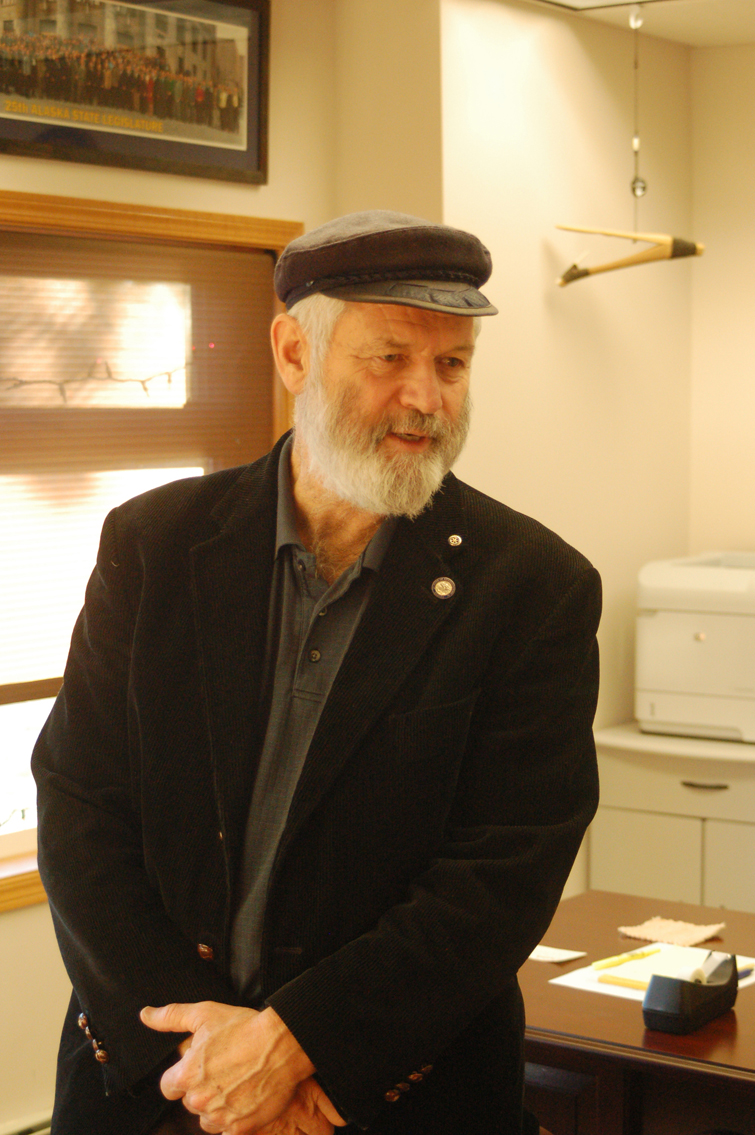As Rep. Paul Seaton, the District 30 representative for Homer, heads to Juneau for the 28th Legislature meeting Jan. 14 to April 14, he’ll be looking forward to a big change in the State Capitol building.
Wifi.
Being able to receive wireless internet service in all but the House floor — where electronic devices are prohibited — means that now Seaton can Skype on his computer from his office when he gives legislative updates to the Homer City Council. Last year when he did so, Seaton had to take his iPad to a Juneau internet café to meet by videoconference with the council.
Early this week, Seaton and his staff packed their bags and headed south to Juneau for the start of the session on Monday. Gaining some new electronic tools should help him as he starts his term in a new district that now includes central Kenai Peninsula communities all the way north to the Funny River area on the south bank of the Kenai River.
Last session, Seaton’s big issue was getting funding in the capital budget for the Anchor Point to Homer natural gas line. With that project funding and engineering started, Seaton looks to another gas line project as a big issue — a proposed North Slope to Cook Inlet natural gas line.
Rep. Mike Hawker, R-Anchorage, and House Speaker Mike Chenault, R-Nikiski, have prefiled House Bill 4 that would change how gas lines are regulated under the Alaska Gasline Development Corporation, or AGDC, and the Regulatory Commission of Alaska. That bill is similar to a version in the last session that came out of the House as it was changed before going to the Senate.
Seaton said he supports a North Slope-Cook Inlet gas line, but questions a key change in House Bill 4: allowing for the gas line to be a contract carrier and not a common carrier utility. The Alaska Pipeline and the Kenai Kachemak Pipeline are common carrier lines, meaning any company sending oil or gas through the lines pay the same tariff. A contract carrier can limit use of the line to specific companies.
“This is basically building it, as I see it, for three private companies for whatever amount we put in there,” Seaton said. If the state helps fund that gas line by putting up a proposed $400 million in engineering and other costs, “It’s basically financing a grid or a road for the first companies,” Seaton said.
Depending on how a North Slope-Cook Inlet gas line act is structured, another concern Seaton has is if it would shut out smaller producers on the Slope. It’s a different approach than the Alaska Gasline Inducement Act, or AGIA, the act passed under former Gov. Sarah Palin to motivate construction of a natural gas line through Canada.
“We were willing to put $500 million into upfront engineering for a common carrier line, because we wanted to make sure everybody would be able to stimulate new exploration on the North Slope,” Seaton said of AGIA.
Another big issue this session is Gov. Sean Parnell’s proposed changes to the state’s oil tax structure. Seaton opposed an earlier version passed by the house, arguing that the full implications of those changes weren’t fully understood. Parnell hasn’t released his version of those changes yet. The governor’s capital budget is half that of 2012, Seaton noted. The good news is that Parnell included matching grants for Homer Harbor projects.
How the oil and gas tax law is proposed to be changed would affect the final capital budget.
“If that sends us into deficit spending, which it would under the current proposals, it’s going to be difficult to get other capital projects funded,” Seaton said.
Seaton is chair of the House Fisheries Committee and sits on the resources, health and social services, and education committees.
“We’ve got a lot of king salmon issues coming up,” Seaton said of fisheries issues. “How is the king salmon fishery going to be conducted in the future here?”
There’s also another minor technological change this session: simpler legislative email addresses, with legislators and their aides having the easier to remember “@akleg.gov” end on email addresses. Constituents can write Seaton at rep.paul.seaton@akleg.gov. Seaton also sends out periodic newsletters, and constituents can sign up for that newsletter by emailing him.
Michael Armstrong can be reached at michael.
armstrong@homernews.com.


